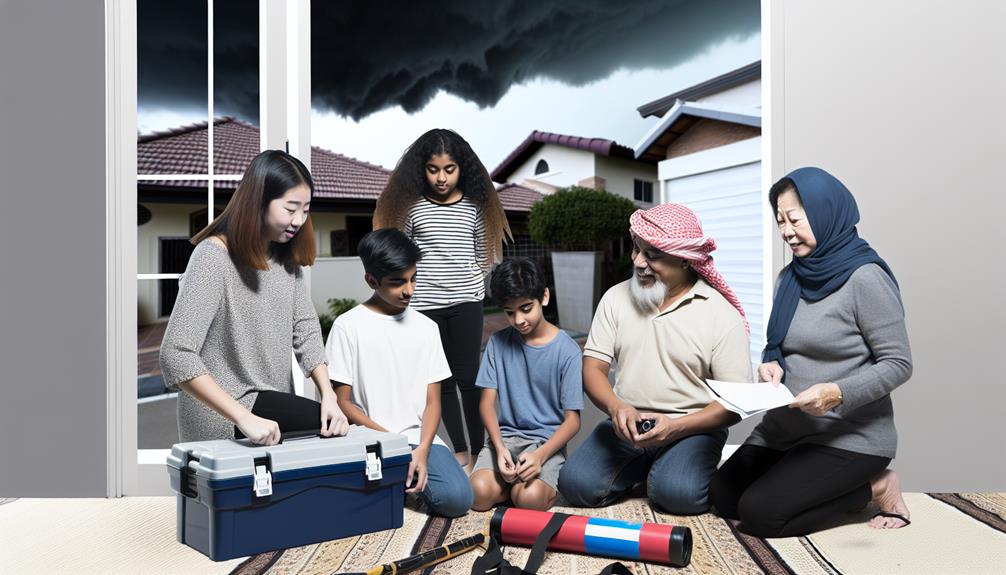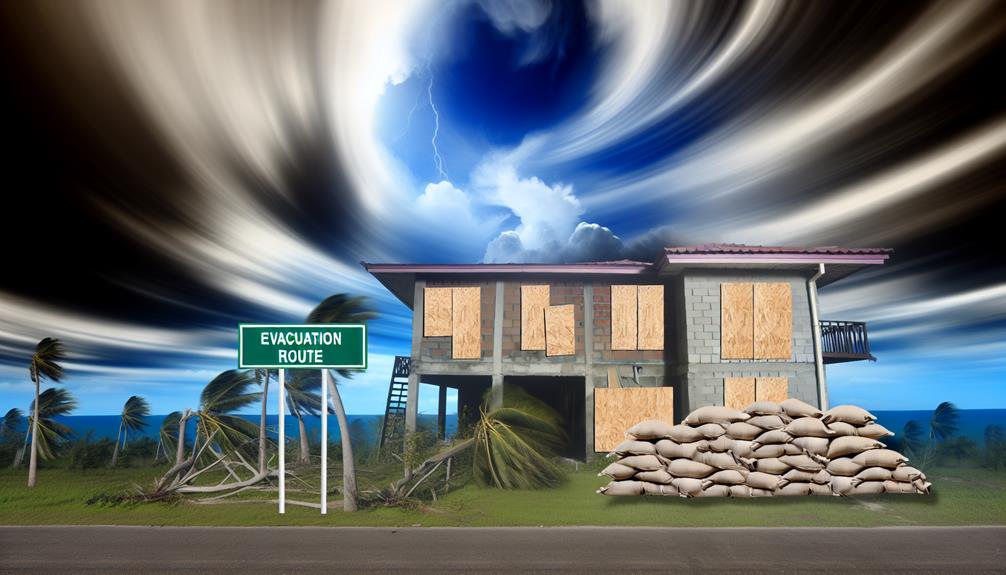As you wind your pocket watch, a task quite out of step with the digital age, consider the timeless importance of preparing for tropical storms. You can’t afford to regard them as mere blips on the radar; they’re formidable events that demand respect and proactive measures.
You must protect your home and property, but beyond that, ensuring the safety of your family is paramount. By taking steps now, you avoid the chaos that descends when warnings turn into reality.
What you do today can mean the difference between being at the mercy of the storm and weathering it with resilience. But how exactly can you transform your home into a bastion against the fury of nature? Stay tuned and discover the critical strategies that can turn the tide in your favor.
Understanding Tropical Storm Risks
Recognizing the risks associated with tropical storms is crucial for your safety and preparedness. These powerful weather systems can unleash a host of hazards, including high winds, heavy rainfall, and storm surges, all of which pose serious threats to life and property.
You’ll likely deal with flying debris, caused by winds that can exceed 73 mph. Such speeds can turn unsecured items into dangerous projectiles, risking injury or worse.
Additionally, the torrential rains can lead to devastating floods, capable of eroding landscapes and inundating homes. You’re not just facing water on the streets; it’s the risk of it invading your living room.
Don’t underestimate the storm surge. It’s a rising wall of water pushed ashore by the storm, and it can swiftly sweep away anything in its path. Even if you’re not in the immediate coastal area, these surges can affect rivers and bays, extending the threat further inland than you might expect.
Protecting Your Home and Property
To safeguard your home and belongings from the ravages of a tropical storm, it’s essential to take proactive measures well in advance.
Start by inspecting your roof, windows, and doors for vulnerabilities. If you spot loose shingles or gaps, fix them promptly to prevent water damage and wind intrusion. Trimming trees and securing loose items in your yard can also minimize the risk of projectiles.
Next, consider installing storm shutters or impact-resistant windows to protect against flying debris. Don’t forget to clear your gutters and downspouts to ensure proper drainage during heavy rains. Flooding is another major concern, so if you’re in a high-risk area, look into flood barriers or sandbags to shield your home’s entrances.
Inside, create an inventory of your possessions. This step is crucial for insurance claims if disaster strikes. Store important documents and valuables in waterproof containers and move them to higher ground to avoid water damage.
Ensuring Family Safety

While securing your property is crucial, ensuring the safety of your family is paramount when preparing for a tropical storm. You’ve got to create a plan that everyone understands. Discuss with your family where you’ll seek shelter if you need to evacuate. Make sure it’s a sturdy building, away from flood-prone areas.
Don’t forget to compile an emergency kit. It should include non-perishable food, water for several days, medications, flashlights, and batteries. Keep important documents like passports and insurance papers in a waterproof container. Remember, you’ll need these items if you’re displaced or if public services are interrupted.
Stay informed by monitoring local news and weather updates. Have a battery-powered or hand-crank radio on hand in case the power goes out. Teach your kids how to recognize the warning signs of a storm and what to do when they hear a weather alert.
Avoiding Last-Minute Chaos
By establishing a clear and practiced emergency plan, you’ll avoid the panic that often accompanies last-minute preparations for a tropical storm. When a storm is imminent, stores are besieged by frantic shoppers, supplies run low, and lines are long. You don’t want to be caught in this chaos, scrambling for necessities when you should be securing your home.
Instead, you should have a kit ready with essentials like water, non-perishable food, medications, and important documents. Knowing exactly what you have and what you still need allows you to skip the rush and focus on other critical tasks, such as boarding up windows or mapping out evacuation routes.
Moreover, familiarize yourself with local shelters and their pet policies if you have furry family members. Last-minute decisions can lead to dangerous delays or oversights. By being prepared, you’ll ensure your safety and the safety of those around you.
Community and Environmental Impact
Tropical storms not only disrupt communities but also wreak havoc on the environment, causing long-term consequences for both people and nature. When a storm hits, you’re likely to see homes, businesses, and public infrastructure suffer significant damage. This disruption can lead to job losses, economic instability, and a decrease in the quality of life for many individuals. The recovery process is often slow and expensive, placing a heavy burden on local governments and communities.
In addition to the human impact, the environment takes a serious hit. You’ll see flooding that leads to soil erosion and the loss of critical habitats for wildlife. Contaminated water sources from storm surges and runoff affect both aquatic ecosystems and human health. Moreover, the landscape may be forever changed, with deforestation and the loss of protective barriers such as mangroves, which are essential for mitigating future storm impacts.
You must understand that the decisions you make today, like supporting wetland conservation and robust building codes, can mitigate these devastating effects. By preparing and taking action to safeguard your community and environment, you’re investing in a resilient future that can better withstand the trials of tropical storms.
Frequently Asked Questions
What Are the Psychological Effects of Experiencing a Tropical Storm, and How Can Individuals Cope With the Trauma Post-Event?
Experiencing a tropical storm can leave you feeling anxious or traumatized. To cope, you’ll want to seek support, practice self-care, and consider professional help if your distress doesn’t ease over time.
How Do Tropical Storms Affect Local Economies and Job Markets in the Short and Long Term?
Tropical storms can disrupt your local economy, damaging businesses and halting jobs. Recovery takes time, affecting both short and long-term employment opportunities as communities rebuild and adapt to the changes.
How Can Individuals With Disabilities or Special Needs Prepare and Find Assistance During Tropical Storms?
You should register for a special needs assistance program and create a personalized evacuation plan. Also, keep an emergency kit and maintain a network of friends who can offer help during storms.
What Are the Implications of Tropical Storms for Pet Owners, and How Should They Prepare to Ensure Their Pets’ Safety?
You must consider your pets’ safety during tropical storms; secure them indoors, prepare an emergency kit, and ensure they’re microchipped in case you’re separated. It’s crucial for their well-being.
How Can Technology and Social Media Be Used Effectively During Tropical Storms for Communication and Staying Informed?
You can use apps and social media to stay updated on storm tracks, receive emergency alerts, and communicate with loved ones during tropical storms, ensuring you’re informed and connected throughout the event.
Conclusion
You’ve learned the risks tropical storms pose and how to secure your home and safeguard your family.
By preparing early, you dodge the pandemonium of last-minute rushes and contribute positively to your community and the environment.
Don’t wait for the storm to loom overhead; proactive steps today can save lives, protect property, and maintain order when nature’s fury strikes.
Take action now, and you’ll navigate the storm with confidence and calm.




